The Second Reading Session of “Hit the Medicine off” has been successfully placed online by Student Directing Committee Instructor Office with “Mirror on Medical History” in recent days. The Club invented six medical students who love reading to serve as the sharing guests that leaded students to read humanities books in medicine and literature. Yuan Yuan, the head of instructor office with “Mirror on Medical History”, hosted the Club and Lu Xin, undergraduate instructor, attended the activity.
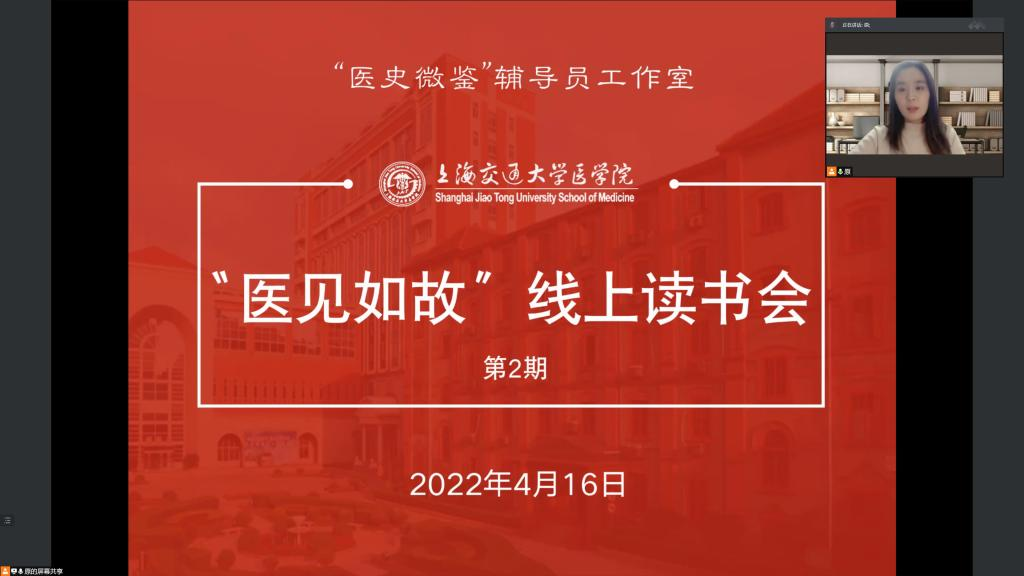
When the activities started, Yuan Yuan asked students to ponder over two questions: at the age of onscreen reading, is it necessary to read? When we are tired of a fragment of reading, what should we do to return to print books? Later, she introduced students a reading story of a writer named Mai Jia to give an emphasis on the strength of “deep reading”: deep reading makes you deeply think that will widen your knowledge and give you the strength of perseverance and persistence, embodied its value in the face of disaster with changes.” She also leaded students to review on the previous reading activities and call on students to read more and read better as well as remain to enrich own spirit at the age of onscreen age.
Reading Sharing
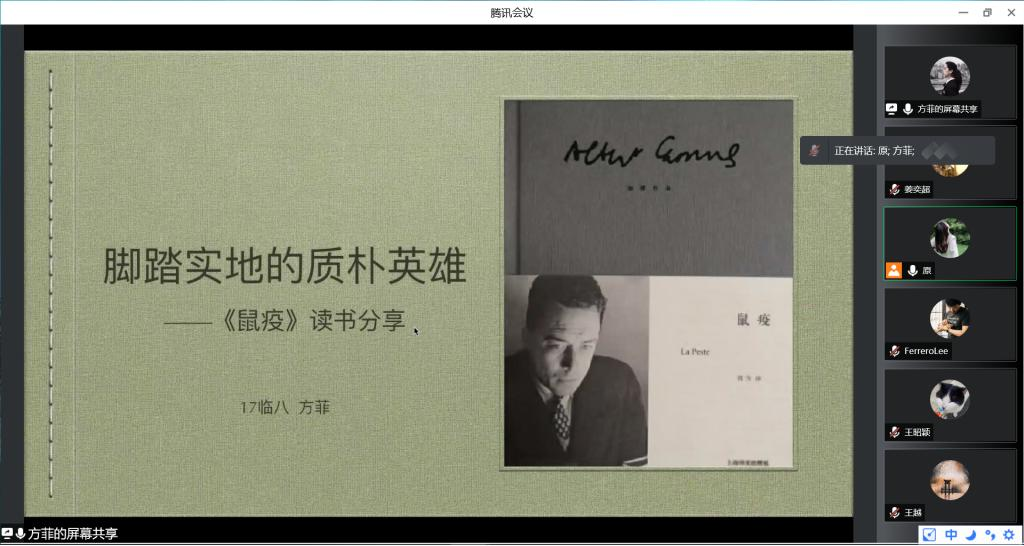
La Peste Written by Albert Camus
Shared by: Fangfei, Clinical Class (81) of 2017
“Actually, the disaster commonly happened in our life, but, people can’t believe it should fall on them.” Fang Fei brought us a classic work of La Peste written by Albert Camus. The book mainly describes a story of people fighting against pestis, among which represented with the hero Dr. Rieux when the outbreak of pestis struck the Oran, a city in the North Africa. In the face of the epidemic, the situation in the story is uncanny resemblance to the reality—lockdown, panic, devotion, fight and no one can detach from it. There are no characterizations of hero in the story, but we are able to absorb the spirit of combating the epidemic from a plain and unimportant person. During the special time, each ordinary people who stick to his post can be a plain hero. If you are so tired that you can’t keep moving on, you might as well read the story of defeating the pestis.
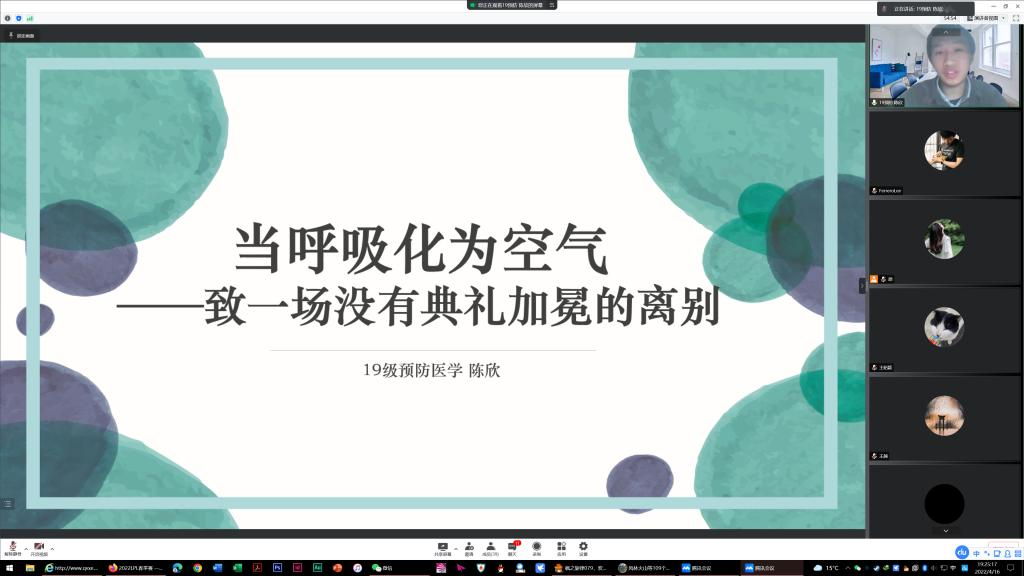
When Breathe Become Air Written by Paul Kalanithi
Shared by: Chen Xin, Preventive Medicine Class of 2019
As a medical student, we often witness all kinds of happiness and sadness. The topic we always face is to probing into the meaning of life from the death. When the grievous news falls on the life on a roll, what should we do to face our life? With her words filled with deep feeling, Chen Xin shared us the When Breathe Become Air written by Paul Kalanithi. Dr. Paul was an excellent neurosurgeon and had made many enviable achievements. However, everything abruptly stopped after the diagnosis of end-stage lung cancer at his age of 35. Since then, he started his writing journey as a double role of a doctor and a patient to look back his doctor career as well as reflect on the meaning of life and death. All of us know the truth of living for the moment and being towards death, but we need to be reminded again and again. The book can make us absorb the courage to face our life while pondering over humanity, life and death and medical treatment.
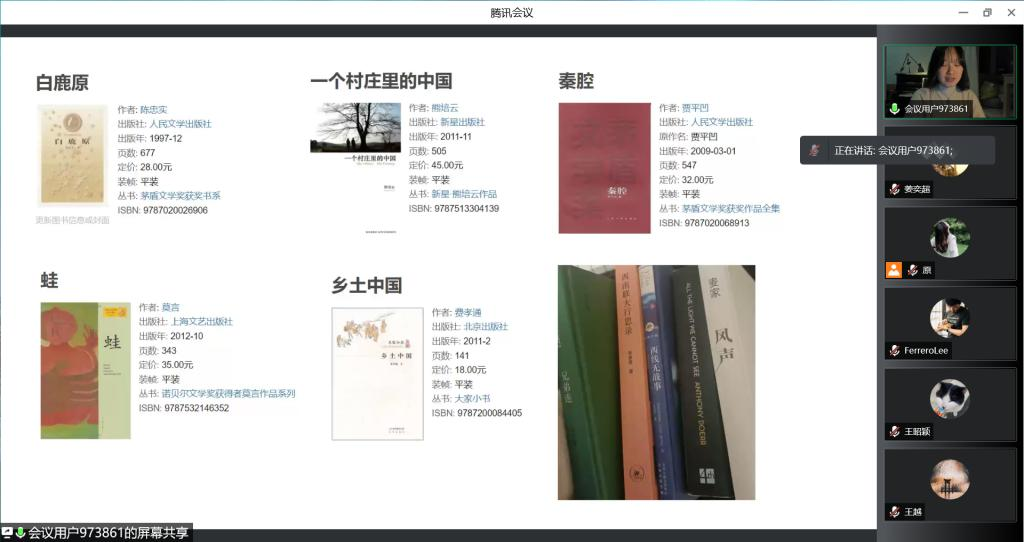
Soldiers Sortie Written by Lan Xiaolong
Shared by: Chen Xiang, Clinical Class (83) of 2017
“What is life’s path? It is declaration of setting out that is written on a page of the land.” It is a novel with trenchant and romantic language that is necessary to read once opened for Chen Xiang, which is different from the TV version. Though the figure of Xu Sanduo has been a pronoun of resolution, he is not a person with forbearance and servility but pursue “how to live more freely.” In the novel filled with “unity, tension, seriousness and liveliness”, the writer does not directly put the belief on your face, but show the rough process of pursuing personal belief, and then you want to be a person like Xu Sanduo who is “independent, woebegone, and yearning for his family but always far from his dream.”
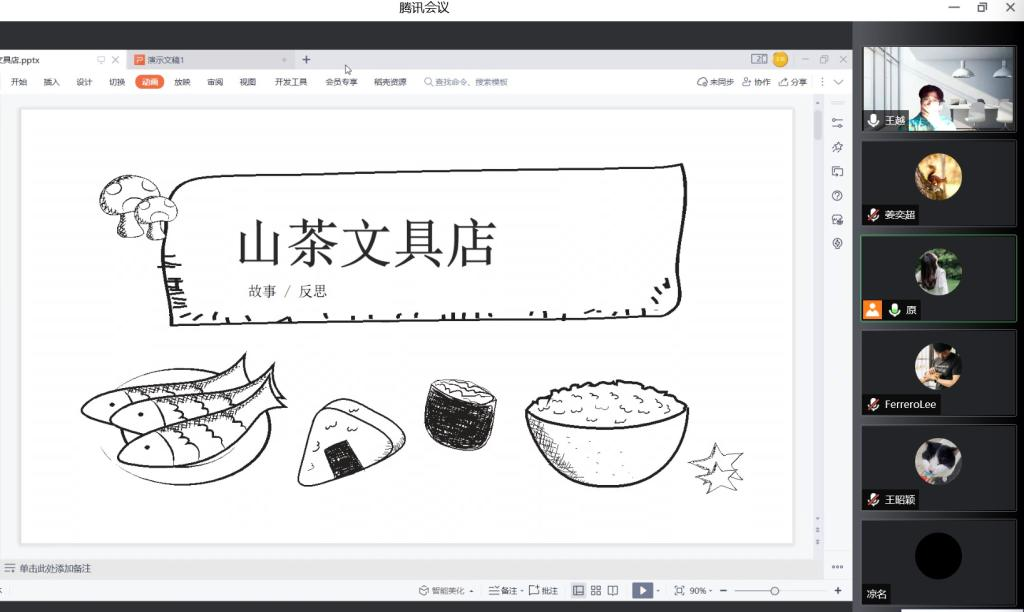
Camellia Stationery Store Written by Xiaochun Mi
Shared by: Wang Yue, Clinical Class (54) of 2020
Wang Yue shared us a healing work of Camellia Stationery Store. The story is short and simple without the ups and downs of the plot. However, the writer’s gentle words can comfort people’s anxious emotions under the epidemic age. From blazing summer to warm spring, we accompany Yugong Jiuzi to send various letters from the Camellia Stationery Story and help her to seek for own fulcrum through client’s emotional world. Finally, she reconciliates with herself and even the world as well as understands the “ordinary life also exudes extraordinary happiness.”
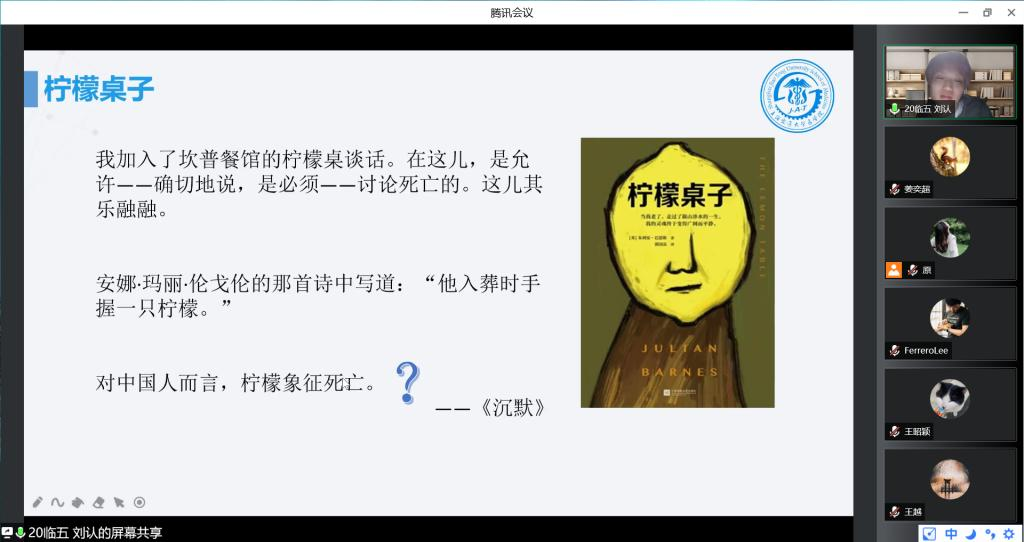
The Lemon Table Written by Julian Barnes
Shared by: Liu Ren, Clinical Class (54) of 2020
The word “senility” may be a little far away from the youth. However, the outbreak of COVID-19 in Shanghai explodes the hard life of the elderly people before us. What should we do if the fire of life begins to dim? Liu Ren shared us the book The Lemon Table written by Julian Barnes. The novel fully describes 11 stories that show us every possibility of growing old and tells us the desire, demand and affection is not always exclusive for the youth. The senility is not terrible but the giving up moving on with time flies. Thus, youth, please live your life!
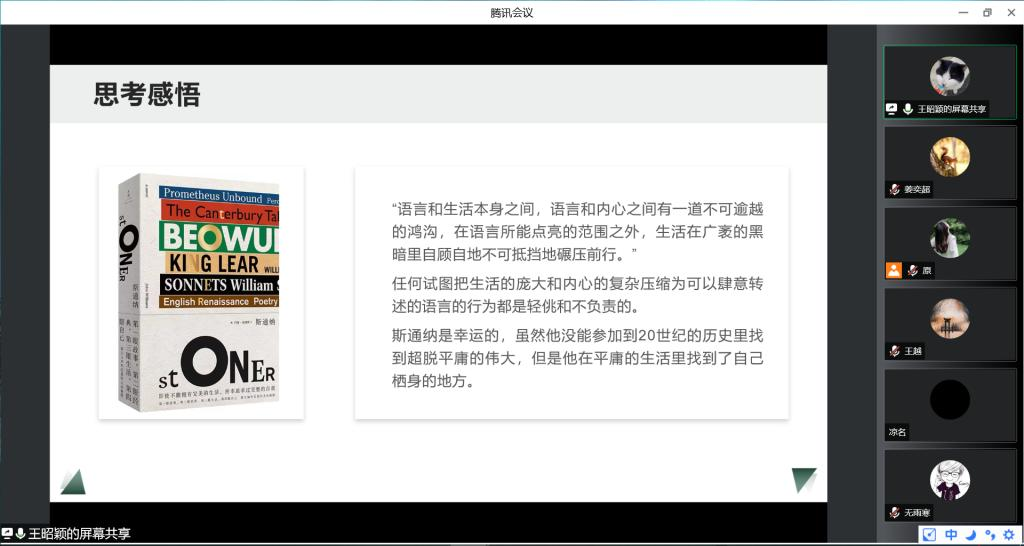
Stoner Written by John Edward Williams
Shared by: Wang Zhaoying, Clinical Class (84) of 2020
We often feel anxious about our life at the age of “involution”. How can we live a happy life if we are the ordinary people in the end? Wang Zhaoying shared us the classic novel of Stoner written by John Edward Williams. Form the point of worldly view, Stoner is just an ordinary person that experienced wedding, giving birth to child, teaching, retiring, and senility as well as dying with his whole life not being related to successes. However, it is just so simple a story that we can reflect on some important topics of love, identification, career, self-esteem and death as well as what we really want. As the saying in the story: “though we didn’t have a perfect life but, fortunately, an entire self.”
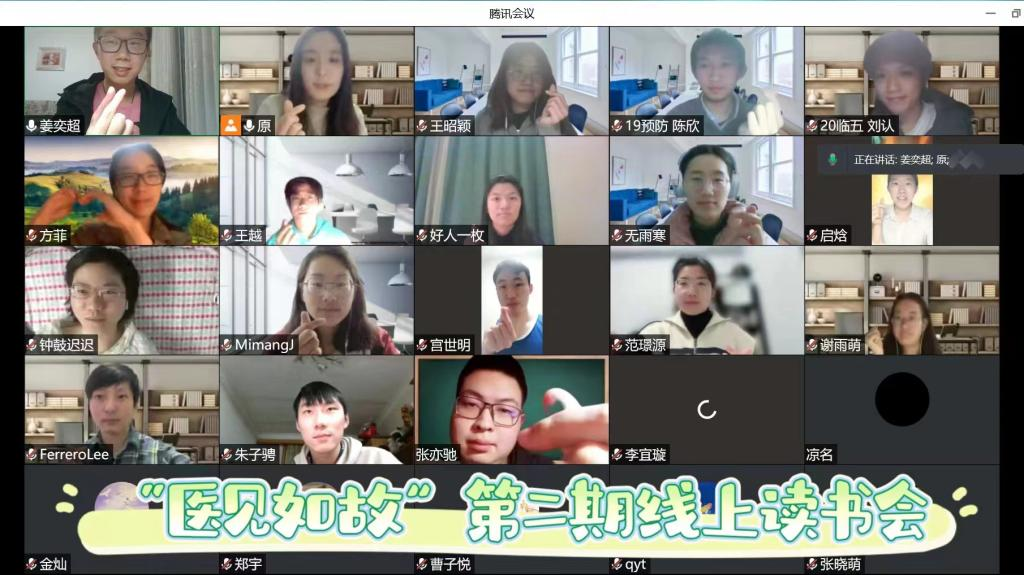
The Reading Club at this time is full of real stuff. Temporally throwing off the uneasiness and noise cause by the epidemic, the students gained knowledge, ability of thinking and strength during the exchanges. Reading will not stop here, and instructor office with “Mirror on Medical History” will continue to hold the activities “Off-line Reading Club, Reading one Book in X Week(s)” and welcome all students to positively attend as well as expect to become intimate with you at our first meeting.

